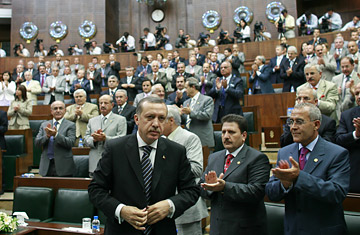
Turkish Prime Minister Tayyip Erdogan leaves his seat to address his ruling AK Party MPs during a meeting at the Turkish Parliament in Ankara on July 29
Who did it? In smoky cafés and on street stoops, that's what Turks are asking after Sunday's devastating bomb attack on a quiet Istanbul street. The attack's timing has fueled the conjecture, since it occurred on the eve of a politically charged court case to ban the governing party. No one has yet claimed responsibility, so the answer — like so much else in a country divided between secularists and Islamists, nationalists and liberal pro-Europeans — depends very much on who's doing the talking.
Surveillance cameras in the blue-collar district of Gungoren show two young men placing two white plastic bags into a garbage bin on a street corner. After the first bomb exploded with deafening reverb, people rushed to the scene; it was then that a second bomb — packed with nails, bits of metal and TNT — went off. The attack killed 17 people and injured 150.
Those are the facts. Police say they suspect the PKK, a Kurdish guerrilla group that has been fighting for self-rule in southeast Turkey since 1984. The bombing may have been retaliation for a military crackdown on rebel positions in the southeast and the mountains of North Iraq, which are being pounded by Turkish fighter jets. On Tuesday, the Turkish military said it had bombed a hideout in Iraq's Qandil mountains, destroying the base and up to 40 PKK militants inside.
But the PKK has denied involvement. And the group doesn't usually target civilians, some analysts point out, noting that the working-class neighborhood of Gungoren is populated by Kurds as well as Turks. "It could be a retaliatory attack by the PKK," says Deniz Ulke Aribogan, an international relations professor at Bahcesehir University. "But this doesn't really fit into the PKK's general strategy. PKK attacks are usually in rural areas and target security forces, rather than directed at a broad public in the city."
For some observers, these inconsistencies suggest an even murkier authorship for Sunday's bombing. Earlier this year, after a yearlong investigation, state prosecutors arrested a total of 86 people — including military officers, journalists and prominent businessmen — for alleged membership in the so-called Ergenekon network, a secret ultra-nationalist militia.
The group is accused of employing a range of dirty tricks — from assassinating high-profile figures to bombing public places — at critical moments to create unrest, weaken governments and replant the seeds of military rule in Turkey. Over the past few days, newspapers have run excerpts from the 2,455-page indictment that suggest a sinister coterie whose alleged conspiratorial deeds wouldn't be out of place in a Dan Brown novel like The Da Vinci Code.
So when Sunday's attack came a day before a top court convened to decide whether to ban the governing party for anti-secularism, and just two days after another court decided to take up the case against the Ergenekon defendants, the timing struck many as significant. "Call me paranoid," says Cuneyt Ulsever, columnist for the mainstream daily Hurriyet. "I think the bomb was Ergenekon at work. It was telling us that they are still here." That seemed to be the angle the PKK itself was taking when it blamed Sunday's attack on "dark forces."
There is yet a third option being discussed, one that merges the two: that the attack was carried out by renegade PKK militants functioning as terrorists-for-hire — perhaps for operators like those fingered in the Ergenekon indictment. "My impression is that this attack was carried out by subcontractors," Sedat Laciner, director of Turkey's International Strategic Research Organization, told the NTV news channel. "It looks like it was planned by a group who infiltrated the PKK. As an organization, the PKK is weakened. It has become open to this kind of infiltration."
The puzzle may never be solved. Critics of the Ergenekon investigation say that while aspects of the indictment may be relevant, the government is using it to avenge a bid by the secularist establishment — namely the courts and military — to close them down for alleged Islamism. Meanwhile, many supporters of the investigation argue that the case could finally rein in ultra-nationalist elements, which have long seen themselves as beyond the law's reach, and thus mark a crucial juncture in Turkey's democratization.
The dispute over the bomb's authorship and whatever shady conspiracy may lurk behind it heightens the expectation, too, for the Constitutional Court's ruling on banning the governing AKP party for undermining Turkey's secular traditions. The judges met for a marathon 12-hr. session yesterday, suggesting that their potentially explosive judgment on that question may not be long in coming.
